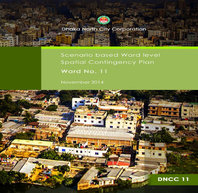- About Us
-
Who we are
-
- Publications
-
- ADPC Academy
-
MediaADPC'S NEWS
Building on the past to make a safer future Building on the past to make a safer future
Nay Pyi Taw, Myanmar
Disaster management is on the forefront of priorities for government agencies in Myanmar. Together, government agencies under the lead of Relief and Resettlement Department have taken on the challenge to build capacity at sub-national level on Disaster Management with a common goal in mind – to reduce communities’ risk to disaster.
In March 2013, Myanmar’s Relief and Resettlement Department led discussions that focused on rethinking how its Disaster Management Course (DMC) could improve as the course hits its mid-term goals.
To date, 7 out of 14 trainings have been delivered in different states and regions across Myanmar over the past year. With improvements on the horizon, the next 7 courses are anticipated to gain momentum throughout the country.Interest Story
Building on existing courses, new challenges overcome
Disaster Management Training is not a new topic in Myanmar. Since 1977, Disaster Management Training has served as a core platform to provide fundamental understanding, knowledge and skills building on broad array of disaster risk management disciplines. Since the first courses’ inception, 77 trainings have been conducted through 2011, and more than 1,500 government officials from various agencies have received professional training.
Unique to Myanmar, the Disaster Management course builds upon previous courses, consid-ering lessons learned and experiences gained from the past. The course avoids duplication, as it is a ‘remodeling’ of the current that exists within the government system. Through extensive govern-ment consultations, the course adds on to the existing providing a fresh approach on how to tackle
new challenges in disaster management. This method also lowers cost; maximiz-ing resource allocation in other areas, such as for example, course trainings.
Course under ‘reconstruction’
Awareness of alarming disaster threats has heightened in recent times. Now there is a pressing need for government agencies to harmonize their knowledge to maximize effectiveness. The course pro-actively takes actions in this direction to enable agencies to effectively deal with and manage the upward trend of disaster impacts.
To meet these needs, the Disaster Management Course is under reconstruction. The objective of the DMC revision is to have more updated and effective training curriculum. The course hopes to develop more competent facilitators that will multiply capacity building on disaster management by training sub-national officers.
Concerted actions result in collective impacts
In December 2011, DMC curriculum development began with CARE Myanmar. Together, CARE coordinated the initiative and ADPC provided technical expertise. To support this process, a Technical Working Group was developed to steer the process comprising of the Relief and Resettlement Department, Department of Meteorology and Hydrology, General Administration Department, Department of Health, Fire Services Department, Forest Department, Irrigation Department,
Department of Agriculture, Department of Educational Planning and Training and members of DRR Working Group Myanmar including UNDP Myanmar, ActionAid Myanmar, UN-HABITAT, Myanmar Red Cross Society, World Vision, CARE Myanmar, Myanmar Engineering Society, Oxfam and UNOCHA.
The courses not only revised curricula and trained a number of facilitators, but also developed the vigorous process that enhanced closer collaboration among various government agencies; sensitizing inter-departmental dynamics and cooperative environment from central down to township level; creating a collective sense of ownership of the training; and most importantly, recognizing the complementary role of government agencies and stakeholders.
Sharing with others
The Disaster Management Course was selected as an initiative to be presented at the ‘Ignite Stage’ at the Global Platform for Disaster Risk Reduction 2013 in Geneva, Switzerland. The initiative will be shared with global practitioners on its process, outcomes, and lesson-learned. As evolving process, current and future dynamics on how the course could move forward and drive capacity building around disaster management in Myanmar is planned to be explored. The future of the course will see vigorous engagement with the Relief and Resettlement Department (RRD) as the focal disaster management agency to nurture the development of the training and ensure its continuity as well as its collective ownership by line agencies involved that contribute to its overall success.
Related PublicationsLatest NewsRelated Trainings
-

